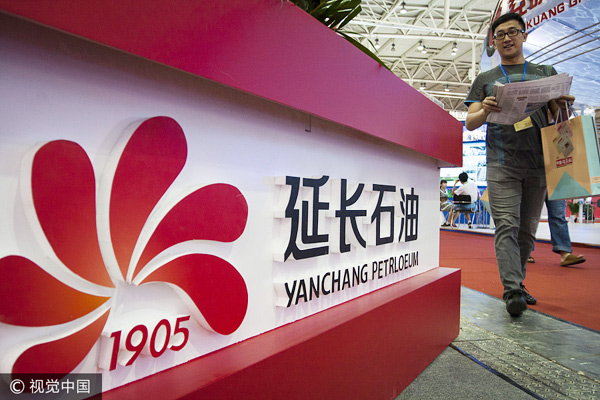Yanchang blazes trail in carbon capture tech
 |
|
A logo of Shaanxi Yanchang Petroleum (Group) Co Ltd is seen at an expo in Beijing in this file photo taken on June 16, 2012. [Photo/VCG] |
Asia's first commercial carbon capture and storage project will begin to operate in northwestern China's Shaanxi province next year, said an executive of Shaanxi Yanchang Petroleum (Group) Co Ltd.
Yanchang Integrated Carbon Capture and Storage Project, with an annual capacity to capture 360,000 metric tons of carbon dioxide, is projected to increase the company's oil recovery of low permeability fields by about 8 percent.
CCS captures carbon dioxide emissions generated by power stations and steel companies, then transports and pumps them deep underground. The captured carbon could also be used to produce beverage-grade CO2.
Jiang Shaojing, a director of Yanchang's research institute, said the project will capture the carbon from its coal chemical units based in a nearby industrial park.
The captured carbon will be injected into the ground to boost Yanchang's oil recovery rate. After that, it will be stored there, he said.
Jiang said the company has completed a feasibility study, which has been filed with the National Development and Reform Commission, and it is awaiting official approval.
"The application of carbon capture and storage to low-permeability oil fields is expected to increase the company's oil recovery rate by about 8 percent," said Jiang, adding that the average level was currently between 14 and 15 percent.
Two projects, boosting the company's capacity to capture CO2 by a total of 1.3 million tons annually, are already up and running, said Jiang.
The government has made efforts in recent years to capture millions of tons of carbon dioxide generated by power stations and steel companies.
In 2013, the NDRC implemented a new policy to promote carbon capture and storage. The policy called on local governments to take further steps on pilot projects, which could enhance research on capturing CO2 to help tackle climate change and create economic benefits.
Li Li, energy research director at ICIS China, a consulting firm on China's energy market, said carbon capture and storage technology will help mitigate emissions from the polluting coal conversion process massively used in coal-to-gas and coal-to-oil projects, but its prospects are more related to curbing emissions than offering commercial prospects.
"Carbon capture and storage technology will definitely help solve notorious pollution issues, whereas enhanced oil recovery for commercial purposes is more of a byproduct rather than the main purpose," Li said.
"The volume will not necessarily be large scale. It's just a new emerging solution (to climate change), and not very popular yet."









